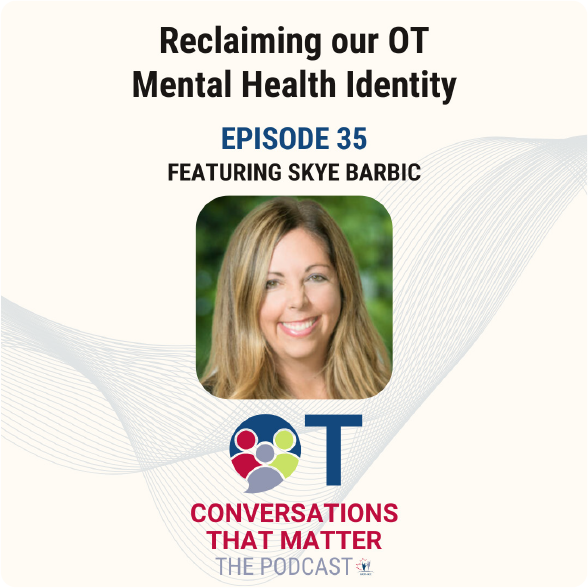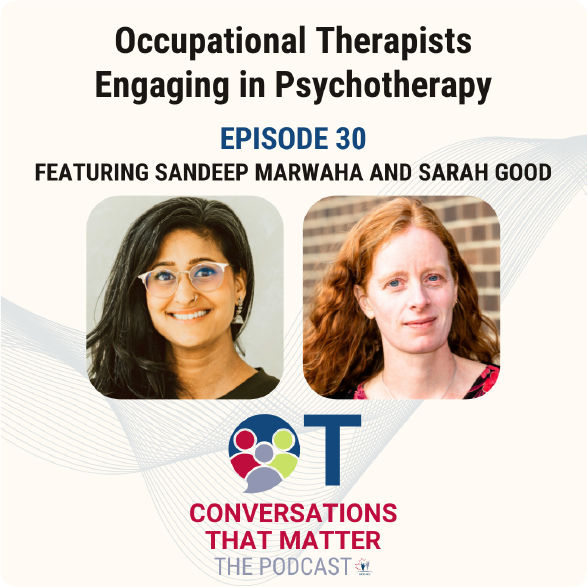
Mental health, as defined by the World Health Organization (2022), is crucial for individuals to cope with life stresses, utilize their abilities, and contribute to society. It affects people regardless of age, culture, education, or income. Mental illness encompasses diverse conditions like depression, anxiety, bipolar disorder, and more, often manifesting as changes in behavior, mood, or thinking. These conditions can range from mild to severe, impacting occupational functioning and causing distress. Understanding and addressing mental health is essential for decision-making, relationships, and meaningful participation in life activities.
This webpage aims to offer readers insights and resources on the role of occupational therapy in mental health care. Across Canada, diverse service delivery models, regulations, and standards of practice shape mental health interventions. CAOT is committed to advocating for nationwide awareness and accessibility of occupational therapy mental health services, while also providing support for regional advocacy initiatives.
Occupational therapy professionals play a multifaceted role in mental health, working with individuals, families, and communities to identify important occupations and activities for well-being. They facilitate psychoeducational groups, covering topics like diagnosis education, self-care, emotional regulation, and social skills. Through experiential learning and occupational engagement, they assist clients in pursuing meaningful activities. Occupational therapy professionals help set and track goals, teach coping techniques, and address the impact of mental illness. They also aid in replacing harmful behaviors with meaningful ones, assess skills for employment or education, and implement skill-building activities. Additionally, they assist in structuring daily lives, applying trauma-informed approaches, and collaborating to promote engagement in healing activities and psychotherapy modalities such as CBT, ACT, and DBT.
Coming soon! Mental Health and Occupational Therapy Practice Document.
Coming soon! CAOT Psychotherapy webpage for more information and resources specific to psychotherapy in occupational therapy.
For foundational information about psychotherapy within occupational therapy practice, visit the College of Occupational Therapists of Ontario's psychotherapy webpage.
CAOT representatives and a team of occupational therapists travelled to Parliament Hill in Ottawa on April 8th and 9th to meet with elected officials and policy advisors to advocate for occupational therapy in mental health. The team engaged in discussions related to the role of occupational therapists in supporting the health and wellness of Canadians, with a specific focus on mental health. The team also proposed amendments to the Income Tax Act to allow OTs to complete the mental function section of the Disability Tax Credit (DTC).
At present, access to mental health services in Indigenous communities is a significant need. OTs are not listed (except Ontario) as eligible mental health counseling providers within Non-Insured Health Benefits (NIHB). Mental health is within an OTs scope of practice and CAOT continues to share feedback and concerns from CAOT membership to the federal government regarding the barriers to accessing NIHB funding.
The 2024 Professional Issue Forum at the CAOT Conference 2024 in Halifax, Nova Scotia, will be focusing on mental health in occupational therapy. The session titled “Meeting the Mental Needs of Canadians – OT in 2034” will be led by occupational therapists Skye Barbic, Stephanie Bizzeth, Curtis Howson, Kim Hewitt McVicker, Michelle Ferguson, Fizza Jafry, Carrie Anne Marshall and Niki Kiepek.
Ask for OT! Resources can be used to take action and inform decision makers that OTs and OTAs are essential to mental health care in Canada and the need access to OT services under public and private health care plans.
Occupational therapists are a key part of the solution to Canada’s mental health crisis – Op-Ed
OTs and OTAs are invited to share OT365 resources to support everyone’s awareness of the benefits of occupational therapy, including in mental health.
For additional information or questions about CAOT’s advocacy efforts and initiatives, please contact advocacy@caot.ca.
Visit our Upcoming Events listings for a full list of workshops and online courses.
- Visit the Practice Resource Hub for a growing number of resources, including with several OT Now articles, to support you personally and professionally as you explore the role of occupational therapy in the context of mental health.
- Visit Find an OT and Find an OT Mentor to connect with occupational therapy mentors working in mental health.
- Consider becoming a member of the Mental Health and Substance Use Practice Network, the Addressing Suicide in Occupational Therapy Practice Network or other Occupational Therapy Networks pertinent to your area of expertise. By joining these communities, you can connect with fellow occupational therapy professionals to exchange insights, share experiences, and access valuable resources.
- For information and resources pertaining to mental health standards in your region, visit your provincial regulatory organization .
- Mental health isn't just a separate issue—it affects everything we do. That's why OT Conversations that Matter: The Podcast explores a range of topics and their links to mental health, including psychotherapy, eating disorders and disordered eating, climate change, primary care, OTA and more. Visit our podcast webpage for a full list of the episodes.

